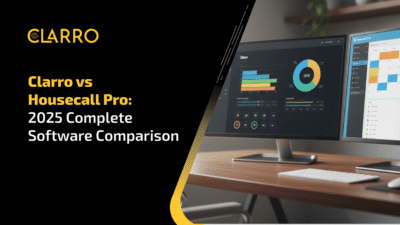Quick summary:
- HVAC field service management software unifies scheduling, dispatch, invoicing, CRM, and inventory into one platform.
- It helps contractors improve responsiveness, reduce admin work, and boost recurring revenue through AMC management.
- Top tools include Clarro (custom Canadian solution), Fieldy (SMB-focused), ServiceTitan (enterprise), Housecall Pro & Jobber (residential), and BuildOps (commercial).
- Key 2025 trends: AI automation, IoT-based predictive maintenance, and mobile-first technician tools.
Running a profitable HVAC contracting business in 2026 means pairing trade skills with the right software. The right HVAC field service management software helps you cut admin time, schedule smarter, keep parts in stock, track technicians in the field, and get paid faster: so you can focus on delivering great service and growing revenue. This guide walks contractors step-by-step through what HVAC FSM (field service management) software does, what to look for, the top vendor options, ROI expectations, implementation tips, and how Clarro fits the Canadian market.
Overview of what HVAC field service management software actually is
HVAC field service management (FSM) software bundles your day-to-day business operations into one place: booking and scheduling, dispatch, technician mobile apps, customer records (CRM), parts/inventory, estimates and invoices, service agreements (AMCs), and reporting. In short, it replaces paperwork, spreadsheets, and multiple disconnected tools with a single system that keeps office staff and field technicians in sync.
Why HVAC software matters in 2026
Customers shop differently today: many research providers online, call for details, and expect fast, transparent booking and communication. Industry data shows a large share of customers contact providers by phone before choosing a contractor, and digital presence and speed matter when you compete for local HVAC work. Adopting FSM software enhances responsiveness, reduces missed appointments, and facilitates the capture of recurring revenue through service agreements.
Real-world ROI from FSM deployments is documented: many field service companies report double-digit gains in productivity or job completion and meaningful reductions in admin time after implementing FSM tools. Some case studies show sizable first-year ROI after operational improvements.
Top HVAC software solutions (quick comparison + who each is for)
Choosing the right HVAC software is critical for contractors looking to streamline operations, improve customer service, and scale efficiently. Below is a quick comparison of leading platforms, their key features, and the types of contractors they serve.
1. Clarro | Digital Growth Partner for HVAC Businesses
Clarro.ca provides custom HVAC software development and digital solutions designed to help contractors streamline operations and scale efficiently. Unlike off-the-shelf tools, Clarro builds tailored platforms that adapt to your workflow and business goals.
Core solutions include:
- Custom HVAC field service management software (scheduling, dispatch, invoicing)
- Contractor CRM systems for customer communication and retention
- Mobile apps for technicians with offline access
- Business intelligence dashboards for real-time insights
- Integrations with QuickBooks, Xero, payment gateways, and IoT devices
Clarro’s focus is on building cost-effective, scalable, and future-ready HVAC business management tools that fit both residential and commercial contractors.
Why choose Clarro: If you’re an HVAC contractor looking for a customized solution that grows with your business, rather than a rigid, one-size-fits-all app, Clarro is your partner in digital transformation. Perfect for contractors who want long-term scalability, advanced integrations, and a competitive edge in the HVAC industry.
2. Fieldy | Best All-Around, Cost-Conscious FSM
Fieldy positions itself as an all-in-one HVAC field service management software built for contractors. Core features include:
- Scheduling and dispatch
- AMC automation and renewals
- Asset management and GPS tracking
- Invoicing and franchise dashboards
- Offline mobile access
Fieldy emphasizes affordability for small and mid-sized teams while claiming measurable ROI improvements.
Why choose Fieldy: A strong balance of HVAC-specific features without enterprise pricing. Ideal for mid-sized residential HVAC companies or regional contractors who want a full stack without heavy customization costs.
3. ServiceTitan | Enterprise Grade, Commercial Scale
ServiceTitan is widely recognized as a premium FSM platform for large HVAC businesses. It includes:
- Deep job costing and commercial workflows
- Advanced analytics and reporting
- Proposal and service agreement modules
- Rich integrations across accounting and CRM
It typically requires an annual contract and is considered one of the pricier solutions, with per-tech costs above small-business tools. Its move into the public markets highlights its leadership in the trades software category.
Why choose ServiceTitan: Best for large commercial HVAC companies and multi-location enterprises that need advanced analytics, custom workflows, and robust scalability.
4. Pro | User-Friendly and Mobile-Forward
Housecall Pro prioritizes a simple, mobile-first experience for technicians and office staff. Features include:
- Drag-and-drop scheduling and online booking
- Built-in payment processing and review management
- Recurring service plans and reporting
Pricing: Housecall Pro publishes transparent pricing (Basic, Essentials, Max plans) on its site, making it easy for small teams to budget.
Why choose Housecall Pro: Designed for small to mid-sized HVAC contractors who want quick adoption, an intuitive mobile app, and built-in payments/marketing tools.
5. Jobber | Client-First Workflows for Residential Service
Jobber is known for prioritizing customer communication and self-service with a client portal. It supports:
- Scheduling, route optimization, and job costing
- Online approvals, booking, and payments
- Integrations with QuickBooks, Xero, and Zapier
Pricing: Transparent tiered plans (Core, Connect, Grow, Plus) make Jobber a straightforward choice.
Why choose Jobber: A strong fit for residential HVAC contractors who prioritize recurring maintenance bookings and seamless client communication.
6. BuildOps | Specialized for Commercial & Project-Based Work
BuildOps is tailored to commercial contractors and mechanical service providers, with advanced modules for:
- Project and asset management
- Compliance and safety tracking
- Crew/job costing and advanced reporting
Pricing: Typically custom, depending on contractor size and scope.
Why choose BuildOps: Ideal for commercial HVAC firms and service providers handling compliance-heavy, large-scale projects.
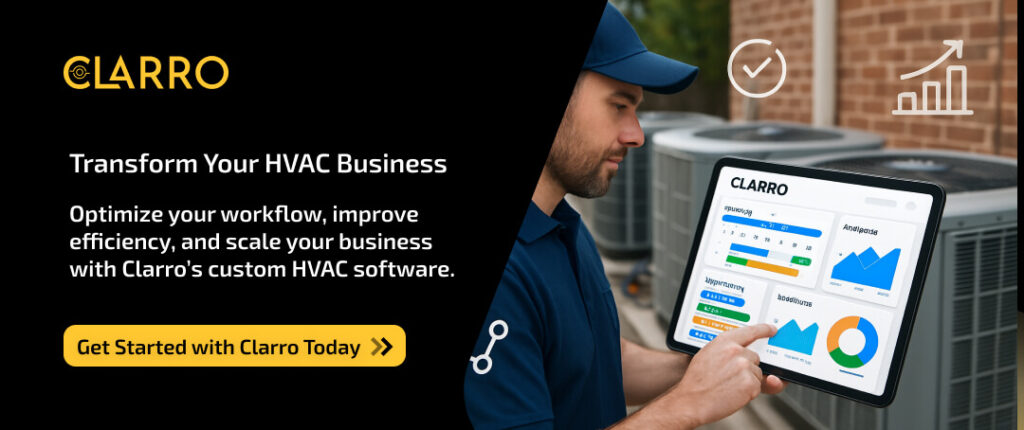
Features to Look For in HVAC Contractor Software
When evaluating HVAC field service management software or contractor tools, it’s not just about brand names: it’s about whether the platform delivers the capabilities your business needs today and in the future. Service business automation forms the backbone of efficient operations, but comprehensive solutions go far beyond basic appointment management.
Smart Scheduling & Dispatch
Look for software that can auto-assign jobs based on technician location, skill set, and availability. Route optimization reduces fuel costs and improves response times. This feature ensures maximum technician productivity and faster customer service.
Technician Mobile App (with Offline Support)
Your field technicians should have access to a mobile app that works even without internet. Must-haves include:
- Job details and customer notes
- Digital signatures and photo uploads
- Offline access with automatic syncing once back online
This ensures uninterrupted workflows, even in basements or remote job sites.
CRM + Customer History
Strong HVAC contractor software includes a built-in CRM system to store:
- Complete service history
- Equipment records
- Communication logs
This makes repeat visits smoother and improves customer satisfaction by giving technicians full context at every job.
AMC / Service Agreement Management
Recurring revenue is key in HVAC businesses. Look for tools that let you:
- Create annual maintenance contracts (AMCs)
- Automate renewals and reminders
- Schedule recurring jobs seamlessly
This ensures predictable revenue streams and long-term customer retention.
Inventory & Asset Tracking
Top HVAC software should help you track parts and assets in real time. Features to look for:
- Low-stock alerts to prevent delays
- Asset service history tied to customer accounts
- Warehouse and truck inventory management
This prevents job delays and keeps your team prepared.
Invoicing & Payments
Modern HVAC FSM software should include:
- Instant invoice generation after job completion
- On-site card/ACH payments
- Sync with accounting systems like QuickBooks or Xero
This reduces payment delays and improves cash flow.
Reporting & Business Intelligence (BI)
Data-driven insights are critical. The right platform should provide:
- Technician productivity reports
- Job profitability analytics
- SLA (service-level agreement) compliance tracking
These insights help HVAC contractors optimize performance and cut costs.
Integrations & API Access
No software can do it all. Confirm whether the vendor supports integrations with:
- QuickBooks, Xero (accounting)
- Stripe, Square (payments)
- Zapier, HubSpot, Mailchimp (marketing tools)
- Telephony/VoIP for customer communication
If your business is scaling, API access ensures you can connect the HVAC platform with your existing tech stack.
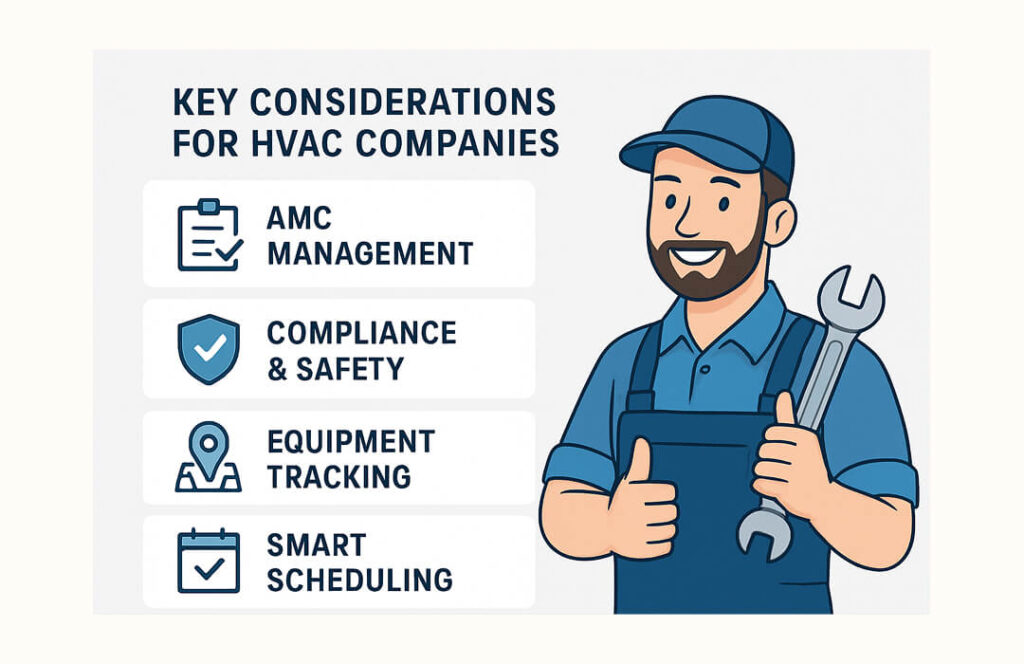
Industry-Specific Considerations for HVAC Companies
HVAC businesses face challenges that are very different from general field service operations. From long-term maintenance contracts to strict compliance requirements and equipment lifecycle management, choosing the right FSM platform can directly impact profitability and customer retention. Here are the must-have considerations for HVAC contractors:
AMC (Annual Maintenance Contract) Management
For HVAC companies, Annual Maintenance Contracts (AMCs) are more than just paperwork: they’re a steady revenue stream and a customer loyalty tool. According to industry reports, over 45% of HVAC service revenue in North America comes from recurring contracts.
A robust FSM platform should:
- Automate AMC renewals with reminders and notifications
- Pre-schedule preventive maintenance to minimize equipment downtime
- Track the profitability of each contract to identify high-value vs. low-value clients
By digitizing AMC processes, HVAC companies can increase renewal rates by 20–25%, ensuring predictable cash flow and higher customer retention.
Compliance & Safety Tracking
Commercial HVAC projects often serve regulated environments like hospitals, schools, airports, and large corporate buildings. This means strict compliance documentation and safety protocols are non-negotiable.
FSM software should provide:
- Built-in safety inspection checklists for technicians
- Audit-ready reports to meet local and national building codes
- Automated compliance logs for contracts involving ASHRAE, OSHA, or LEED standards
This reduces liability risks and helps HVAC contractors win bids on high-value commercial projects that demand transparent compliance records.
Equipment & Asset Tracking
Every installed HVAC unit, from chillers to rooftop systems, has a lifecycle of 10–20 years, making detailed asset tracking critical. Technicians often waste time without a full service history. FSM platforms that centralize equipment data can reduce troubleshooting time by 30%.
Look for features like:
- Serial number, warranty, and part replacement tracking
- Photo attachments, repair notes, and IoT-based usage data
- Complete service history linked to each customer’s asset
This not only saves time during repeat visits but also strengthens customer trust by showing a data-backed maintenance record.
Service Scheduling Software
Efficient appointment management is the cornerstone of customer satisfaction and technician productivity. Look for scheduling tools that offer drag-and-drop calendars, technician availability views, and automated reminders. Advanced service scheduling software also supports time-slot customization and prevents double-booking, ensuring you maximize billable hours and minimize no-shows.
Digitization is no longer optional in HVAC. Contractors adopting FSM platforms report up to 25% faster job completion times and 30% lower admin overhead. For Canadian HVAC service providers, Clarro offers a tailored platform with AMC automation, compliance-ready workflows, and full equipment history tracking: helping businesses scale efficiently.
Pricing & ROI–How HVAC Businesses Should Think About Investment
Choosing the right HVAC field service management (FSM) software is not just about finding the lowest subscription fee. The real measure of value comes from balancing pricing transparency, total cost of ownership (TCO), and the return on investment (ROI) that software can deliver. Contractors should look beyond monthly licenses to factor in adoption speed, feature relevance, measurable business outcomes, and robust business management software.
1. Pricing Signals in the HVAC FSM Market
Pricing varies widely depending on whether a platform is designed for small contractors, mid-sized regional operators, or large enterprise firms.
- Small Business Solutions (Published, Tiered Pricing):
Tools like Jobber and Housecall Pro make pricing straightforward, with published plans starting at $40–$100 per user/month. These plans usually cover essentials like scheduling, invoicing, and payment processing. For teams under 20 technicians, the transparency makes budgeting easier and limits surprise costs.
- Enterprise Platforms (Custom Quotes):
Vendors such as ServiceTitan and BuildOps typically provide pricing only through direct quotes. Independent contractor reports place ServiceTitan’s cost in the range of $250–$350 per technician/month when bundled with advanced modules like compliance, BI dashboards, and call center integrations. This pricing reflects the enterprise-grade support, reporting depth, and integrations needed by multi-location or commercial-heavy contractors.
- Mid-Market & Growth-Focused Tools:
This is where platforms like Clarro fit in. Clarro is positioned as a more cost-conscious alternative to enterprise systems while still offering premium HVAC-specific features such as AMC automation, compliance workflows, and asset history tracking. For teams in the 10–50 technician range, Clarro often delivers enterprise capabilities at a lower TCO, making it attractive to regional contractors scaling fast.
2. Hidden & Add-On Costs to Watch
One of the biggest mistakes contractors make is comparing “base pricing” only. Most FSM vendors add costs for advanced features:
- GPS tracking & vehicle telematics: typically $10–$20 per vehicle/month
- Custom integrations (QuickBooks, Xero, payment processors, telephony): one-time setup or ongoing fees
- Advanced reporting & BI dashboards: often gated behind higher-tier plans
- Proposal/price-book tools: sometimes a separate module
- Extra admin or office seats: beyond technician licenses, office users may be billed separately
Contractors should always request a line-item breakdown of base license fees vs. add-ons during demos. Failing to account for extras can raise monthly costs by 20–30%.
3. ROI Benchmarks from HVAC Companies
The investment in HVAC FSM software often pays off quickly. Industry case studies and independent surveys highlight common outcomes within the first 6–12 months of adoption:
- 15–25% increase in technician productivity due to optimized scheduling and fewer routing conflicts.
- 30–40% faster invoice collection cycles, thanks to digital invoicing and on-site payment capture.
- 10+ hours of admin time saved per week in scheduling, billing, and compliance reporting for teams of 10–20 techs.
- Reduction in missed or delayed appointments by 20%+, leading to improved customer satisfaction and higher retention rates.
For contractors running Annual Maintenance Contracts (AMCs), ROI can be even stronger. Automated reminders and recurring billing reduce churn and drive predictable monthly revenue.
4. Quick ROI Calculation (Contractor-Friendly Formula)
Before committing to a vendor, HVAC companies can run a simple cost-benefit analysis:
- Admin savings: Estimate admin hours saved per week × average hourly wage
- Productivity gains: Add extra jobs completed per week × average job margin
- Subtract costs: Deduct monthly license + add-on fees
If the equation balances positively, the investment is justified. Many HVAC contractors validate this through a 90-day pilot project before rolling out to the full team.
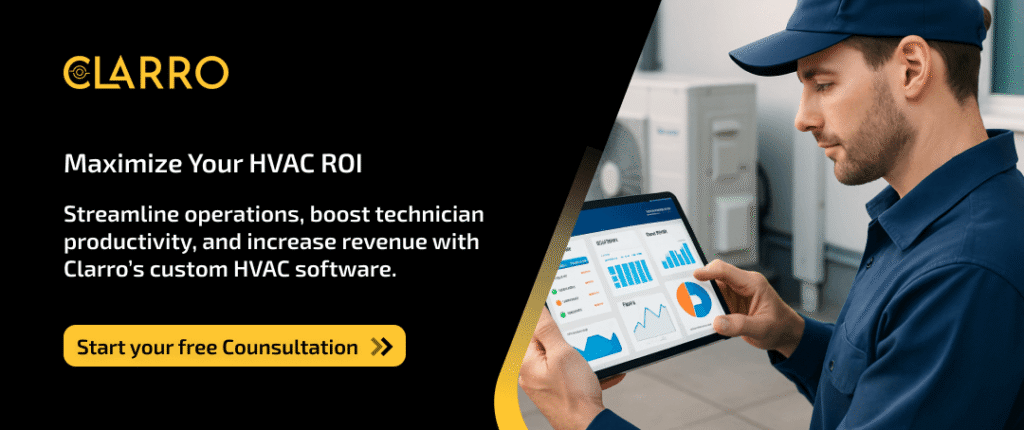
Implementation Best Practices for HVAC Software | Step by Step
Investing in HVAC field service management (FSM) software is only half the journey — successful implementation determines whether you see measurable ROI. Research from SoftwareAdvice shows that 38% of contractors struggle with poor adoption when rolling out new FSM platforms. To avoid costly delays and ensure a smooth transition, HVAC businesses should follow a structured, step-by-step process.
1. Set Clear Business Goals
Define exactly what you want the software to achieve. Examples include:
- Reducing admin work by 10+ hours per week
- Cutting dispatch response times from 3 hours to under 1 hour
- Increasing AMC (Annual Maintenance Contract) renewal rates by 15% within six months
- Shortening invoice collection cycles from 14 days to 5 days
Having measurable targets ensures the software rollout is tied to ROI, not just “new tech adoption.”
2. Map Existing Processes
Document your current workflows across dispatch, scheduling, invoicing, and AMC management. Identify gaps such as:
- Paper-based job sheets are causing delays
- Duplicate data entry between accounting and scheduling
- Parts shortages due to a lack of real-time inventory tracking
According to Field Service News, 42% of contractors cite poor process visibility as the biggest barrier to scaling operations. Mapping gaps early makes it easier to configure your new FSM software.
3. Start with 1–2 Pilot Crews
Rolling out software to your entire team on day one can create chaos. Instead, select one or two pilot crews (5–10 technicians) to test real-world workflows.
- Monitor adoption, collect technician feedback, and troubleshoot issues before scaling.
- This reduces disruption and builds internal champions who can mentor others.
Contractors who pilot first report 30% faster adoption across the company compared to full-scale rollouts.
4. Plan Data Migration Properly
Your HVAC business likely has years of customer history, service logs, and pricing data. Poor migration can erase critical context. Best practices include:
- Exporting clean CSVs for customers, service history, parts lists, and pricing tables
- De-duplicating records and validating email/phone numbers
- Testing a small data set before full import
Data errors during migration are one of the top three causes of failed software projects. Taking time here prevents long-term headaches.
5. Train Field & Office Staff Separately
Technicians, dispatchers, and managers all use the software differently. Role-based training is critical:
- Field staff: mobile app navigation, offline job details, signature capture, on-site invoicing
- Office staff: dispatch dashboard, AMC renewals, customer CRM history, reporting tools
- Provide cheat sheets and short video walkthroughs for reinforcement
Studies show that structured training increases adoption rates by 46% compared to “learn on your own” approaches.
6. Measure & Iterate with KPIs
Once the software is live, measure performance against your original goals. Useful HVAC KPIs include:
- Jobs completed per day per technician
- Average invoice collection days outstanding
- AMC renewal rate (%)
- Customer satisfaction scores (CSAT or NPS)
Use these metrics to fine-tune workflows. Continuous improvement ensures the system evolves with your business.
7. Leverage Vendor Onboarding & Support
Most vendors, including Clarro, provide onboarding specialists, migration support, and dedicated account managers. Use these resources instead of handling everything internally.
- Ask vendors for industry-specific templates (AMC contracts, compliance checklists, pricing sheets).
- Schedule regular check-ins during the first 90 days to stay aligned.
Contractors who fully engage with vendor onboarding report 50% faster time-to-value compared to those who attempt a DIY rollout.
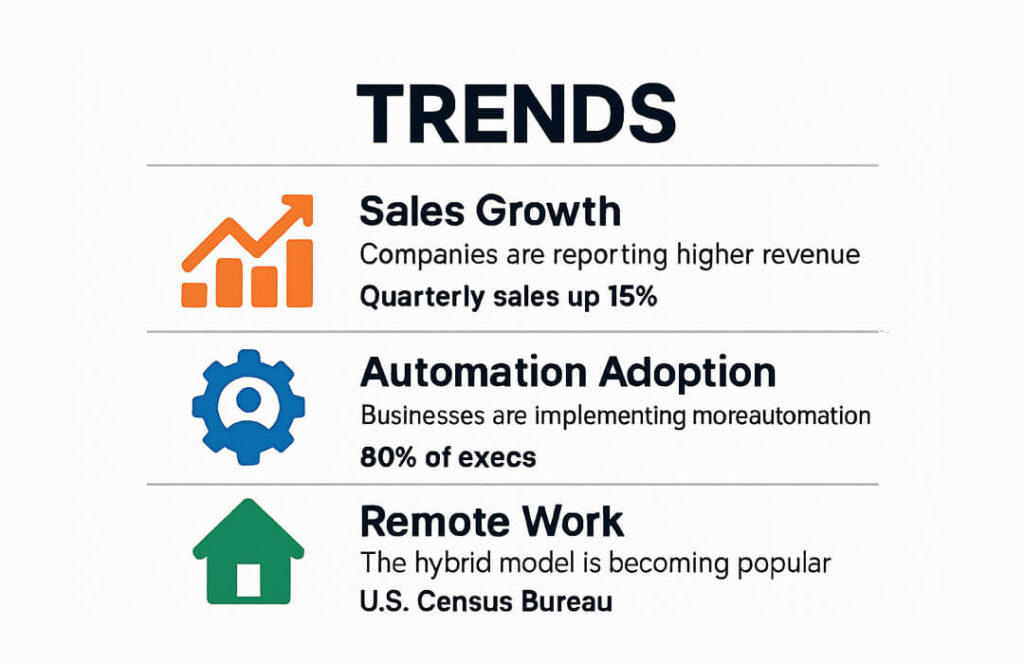
Future Trends to Watch in HVAC Field Service Software
The HVAC industry is evolving rapidly, and software is no longer just about dispatching and invoicing. Emerging technologies are reshaping how contractors deliver service, generate revenue, and retain customers. Based on industry reports and adoption patterns, here are the key trends to watch:
1. AI & Automation in HVAC Operations
Artificial intelligence is becoming a core feature in field service management (FSM) platforms. According to a 2024 McKinsey study, businesses using AI-driven automation in scheduling and routing improved fleet efficiency by 20–25%.
- Automated scheduling: AI tools can now auto-assign jobs based on location, technician skills, and traffic conditions.
- Quote generation: Instant, AI-generated estimates help contractors respond to leads faster, improving win rates.
- Predictive recommendations: AI can analyze past job data to recommend upsell opportunities (e.g., suggesting AMC renewals when warranty expiration is near).
Expect these capabilities to move from “premium add-ons” to standard modules in HVAC software by 2026.
2. IoT & Remote Monitoring with Smart HVAC Systems
The global smart HVAC market is projected to grow from $17.1 billion in 2024 to $25.4 billion by 2028 (CAGR 10.3%), driven by IoT adoption.
- Sensor integration: HVAC software is starting to connect directly with IoT-enabled thermostats, air quality monitors, and unit sensors.
- Predictive maintenance: Instead of waiting for a breakdown, technicians can be dispatched before failure occurs using real-time sensor alerts.
- Remote diagnostics: Contractors can troubleshoot issues remotely, reducing truck rolls and cutting service costs by up to 15–20%.
For contractors with AMC-heavy businesses, IoT integration means more uptime for customers and higher recurring revenue.
3. Mobile Enhancements for Field Technicians
With 80% of HVAC workforces now mobile-first, vendors are heavily investing in mobile app capabilities:
- Offline-first apps: Essential for technicians working in basements, rooftops, or rural locations where connectivity is weak.
- AR-assisted troubleshooting: Augmented Reality overlays allow techs to see wiring diagrams or repair instructions directly through their phone or smart glasses. This trend is already piloted by enterprise vendors and is expected to trickle down to SMB-focused platforms within the next two years.
- Voice-enabled commands: Hands-free job updates and note-taking are emerging, helping technicians save time on admin tasks.
How Clarro Fits into the HVAC Software Landscape
Clarro offers a comprehensive SaaS business management solution specifically designed for service businesses in Canada, including HVAC contractors. The platform provides essential features that HVAC businesses need to streamline operations and grow their customer base.
Clarro’s HVAC-Relevant Features
Booking Management System: Clarro’s booking management capabilities allow HVAC contractors to efficiently handle service requests, view and approve bookings, and manage payment status and invoicing: all critical functions for busy HVAC operations.
Time Slot Management: The platform offers sophisticated scheduling with availability calendars for service providers, slot customization for different service durations, and automatic blocking of overlapping appointments. This feature is particularly valuable for HVAC contractors managing multiple technicians and varying job types.
Real-Time Service Tracking: Clarro enables HVAC contractors to establish customer confidence through real-time service tracking and timely fulfillment, essential for emergency HVAC services where customers need immediate updates.
Multi-Channel Customer Communication: The software efficiently reaches clients across various channels, including email, WhatsApp, website integration, and social media platforms through automated marketing strategies—helping HVAC contractors maintain consistent customer engagement.
Flexible Payment Processing: Clarro empowers customers to pay using their preferred payment methods with versatile payment system integration, from PayPal to digital wallets, providing the payment flexibility modern HVAC customers expect.
Role-Based Access Control: The platform includes user registration and profile management with role-based access control, allowing HVAC business owners to manage different permission levels for office staff, technicians, and management personnel.
Why Choose Clarro for Your HVAC Business
For Canadian HVAC contractors looking for an affordable, locally-focused solution, Clarro offers several advantages:
- Canadian Market Focus: Specifically designed for Canadian service businesses with local payment processing and regulatory compliance
- Scalable Architecture: Suitable for small HVAC contractors looking to grow into larger operations
- Industry Versatility: While not exclusively HVAC-focused, the platform’s service business features align perfectly with HVAC operational needs
- Integration Capabilities: Robust APIs allow integration with existing HVAC-specific tools and systems
- Cost-Effective Solution: Competitive pricing structure ideal for small to medium-sized Canadian HVAC businesses
The platform’s focus on service business management, combined with its Canadian market understanding, makes it a compelling choice for local HVAC contractors ready to modernize their business operations.
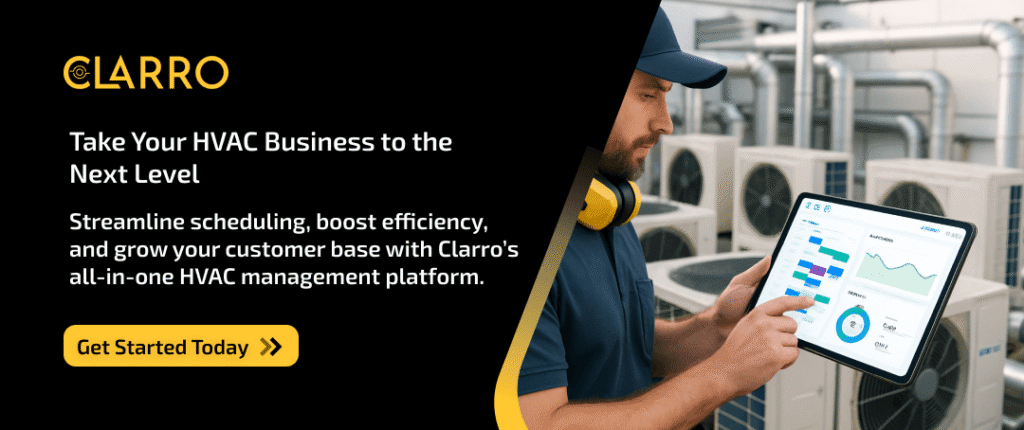
Conclusion:
Choosing the right HVAC field service management software is essential for contractors aiming to streamline operations, boost productivity, and grow recurring revenue. By prioritizing features like scheduling, AMC management, compliance tracking, and mobile accessibility, and considering pricing, ROI, and emerging trends like AI, IoT, and AR-assisted mobile tools, HVAC businesses can make informed decisions and stay competitive in 2025 and beyond.
FAQs
Q1: Which HVAC software is best for small contractors?
Small contractors benefit from mobile-first, easy-to-use platforms that simplify day-to-day operations. These tools provide integrated scheduling, dispatch, invoicing, and payment processing, making it easier for teams of under 20 technicians to manage jobs efficiently and reduce administrative overhead.
Q2: Do I need custom pricing for commercial HVAC work?
Large commercial or multi-location contractors typically require enterprise-grade FSM solutions. Custom pricing ensures access to features like advanced job costing, compliance tracking, multi-location scheduling, and project management, which are essential for managing complex commercial operations.
Q3: What ROI can I expect from HVAC FSM software?
HVAC contractors often report double-digit improvements in productivity, faster invoice collection, and fewer scheduling errors. ROI depends on your team size, workflow adoption, and process optimization. Using pilot programs or case studies can help estimate expected gains before full implementation.
Q4: How important is mobile and offline access for technicians?
Mobile and offline access is critical. HVAC technicians often work in basements, on rooftops, or in areas with poor connectivity. Apps that allow offline job details, photo attachments, and signature capture ensure that technicians can complete work without delays and keep data synced once connectivity is restored.
Q5: How can software help manage AMC (Annual Maintenance Contract) renewals?
FSM software automates AMC reminders, preventive maintenance scheduling, and recurring billing, reducing missed renewals and ensuring predictable revenue. These features also help contractors track service history, customer agreements, and contract profitability efficiently.



